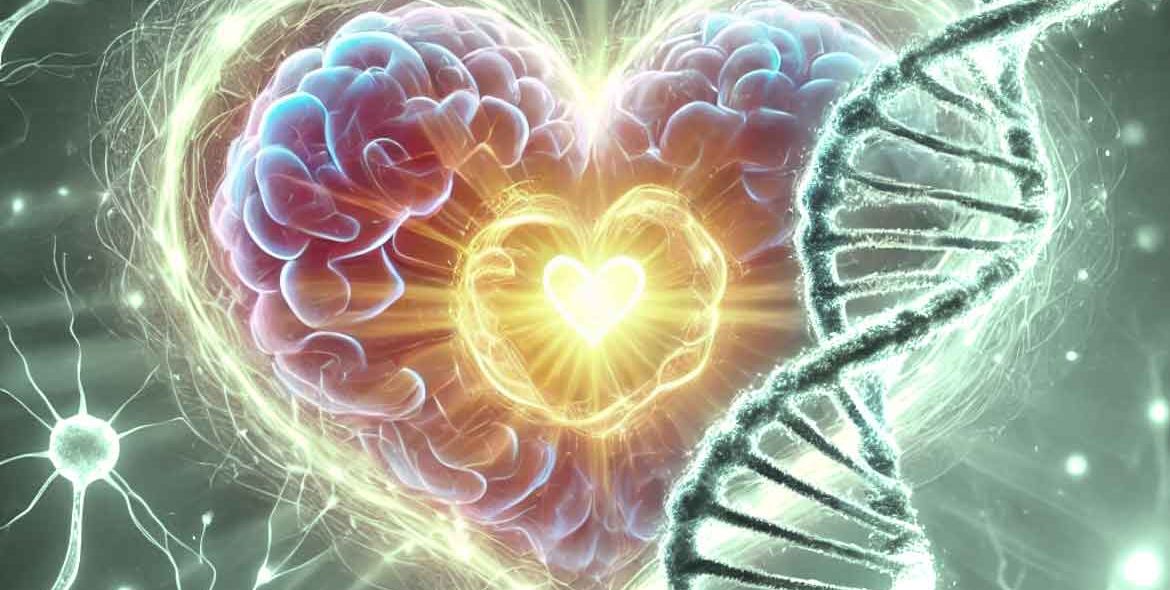Is there a biological factor that determines how stress-resistant an individual is? And if so, can it be influenced?
Stress is our body’s natural response to challenging situations. However, chronic stress can have serious health consequences, including anxiety disorders, depression, cardiovascular disease and a weakened immune system. The question of why some people are better able to cope with stress than others has occupied researchers for decades.
A groundbreaking discovery in this area was made in 2004 by Canadian neuroscientist Michael Meaney. In a publication in “Nature Neuroscience”, his research showed that parental care not only shapes the behaviour of offspring, but also has a direct effect at a genetic level – a finding that has far-reaching implications for our understanding of epigenetics, stress management and mental health.

Epigenetics – environmental factors and interpersonal relationships have a direct influence on the activity of our genes
What is the anti-stress gene and how does it work?
All of our approximately 23.000 genes have a kind of switch to which messenger substances dock for regulation and thus influence the activity of the gene.
In the 1990s, Meaney carried out a series of experiments with rats. He observed that young animals developed differently depending on how intensively their mothers cared for them. It was particularly noticeable that baby rats that were frequently cleaned and cared for by their mothers were significantly more stress-resistant as adults than their less-cared-for counterparts.
Meaney discovered that these differences were due to an epigenetic change in a specific gene: the glucocorticoid receptor gene. This gene is partly responsible for the regulation of stress hormones in the body. When it is active, the body can efficiently reduce stress hormones such as cortisol, which leads to better stress management.
In rats that received a lot of maternal care, this gene was more active in their brains. In contrast, neglected rats showed lower gene activity, which meant that they were more anxious and more susceptible to stress.
The central finding of Meaney’s research is that genes do not determine our fate, but that their activity can be altered by environmental factors – in this case by maternal care.
Such epigenetic mechanisms are chemical changes to the DNA or the proteins surrounding it. They influence how active certain genes are without changing the actual DNA sequence. In Meaney’s experiments, maternal care led to increased demethylation of the glucocorticoid receptor gene, making it more active.
Loving care can therefore be biologically “inscribed” on a molecular level – and these changes can last a lifetime.
What does this finding mean for us?
Meaney’s research suggests that early childhood care can also have long-term effects on the ability to cope with stress in humans. Children who grow up in loving, supportive environments may develop a stronger genetic endowment against stress than others.
Psychoneuroimmunology researcher Prof. Dr Joachim Bauer points out that such a disposition can mature, even if it did not develop in early childhood. Good therapeutic work and interpersonal relationships can have a positive, strengthening influence.
Ultimately, this means that positive changes in our environment can influence our biological heritage – always!
What are the signs that my anti-stress gene is not working optimally?
- I feel overwhelmed more often than others.
- After stressful situations, it takes a long time for me to calm down again.
- I often feel tense, nervous, restless or anxious inside – even for no apparent reason.
- I have trouble falling asleep or sleeping through the night because my brain “won’t switch off”.
- Irritability and emotional instability – small things quickly upset me or cause mood swings.
- Due to the constant tension, I have concentration problems and my cognitive performance is impaired.
- I am very sensitive to coffee or other stimulating substances because my dopamine and adrenaline metabolism may be slowed down.
- Physical complaints such as tension, headaches or digestive problems can be exacerbated by chronic stress.
What can support the activation of my anti-stress gene?
Hypnotherapy can be an effective way to activate the anti-stress gene by bringing about profound changes in stress processing. Here are some ways in which hypnosis can positively influence gene expression:
- Specific hypnosis techniques for activating your anti-stress gene
- Regression therapy → dealing with past stressors can change epigenetic patterns
- Epigenetic changes through mental reprogramming
- Hypnosis can uncover and transform deeply rooted stress patterns in the subconscious → such changes can alter epigenetic markers in favour of stress resistance
- Regulation of the hypothalamic-pituitary-adrenal (HPA) axis & cortisol levels
- Chronic stress often leads to over activation of the HPA axis, resulting in the release of too much cortisol → studies show that hypnosis can help to calm the HPA axis and reduce the release of cortisol
- Promotion of relaxation & resilience
- Hypnotic trance reduces the activity of the sympathetic nervous system (fight-or-flight response) and activates the parasympathetic nervous system (resting mode) → this can promote the expression of genes associated with anti-inflammation, cell protection and emotional stability
„Almost everything will work again if you unplug it for a few minutes…. Including you.“
Anne Lamott


